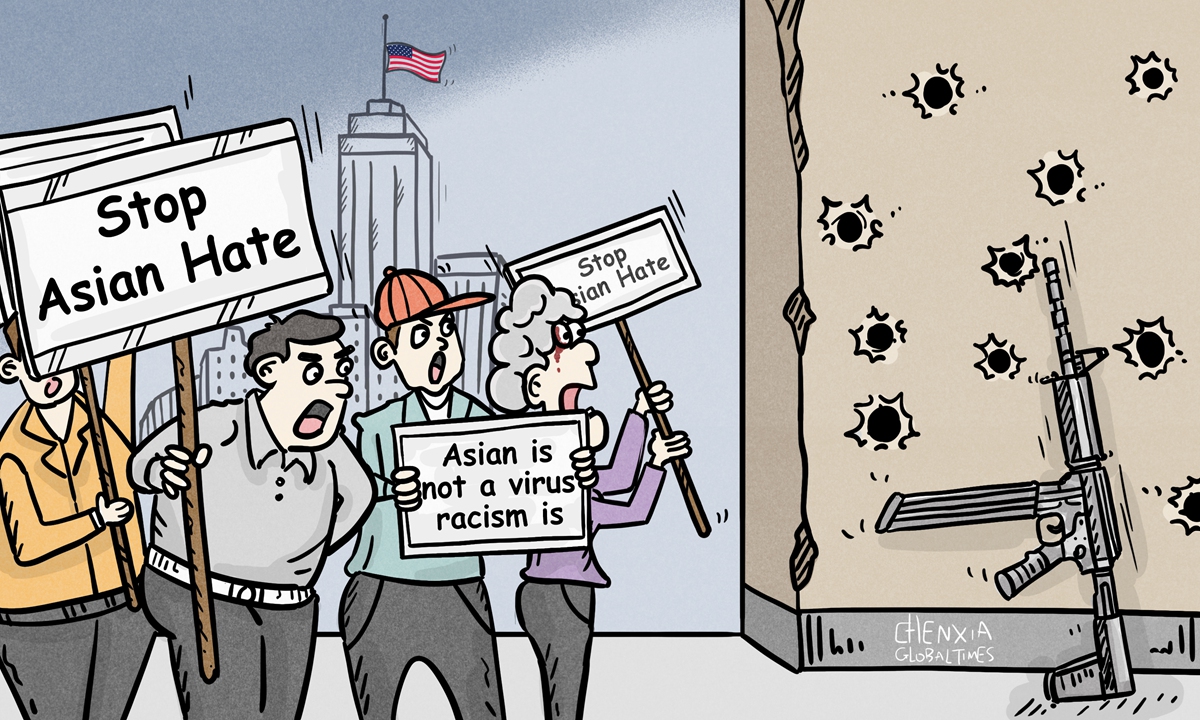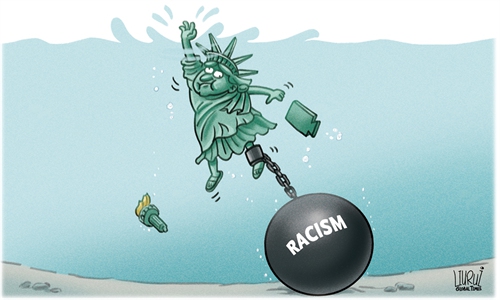
Illustration: Chen Xia/GT
The #StopAsianHate mass rallies over the weekend in the US reminded people about the BLM movement, and some also tried to create a similar slogan such as "Asian American Lives Matter." But a crucial issue is, do Asian American lives really matter in the US? Compared with the long-time struggles of African Americans against racism, the Asian Americans have a longer and more difficult way to go.For one thing, the latest anti-Asian American wave was systematic and made worse by the rising bigoted and hateful rhetoric against China. For another, the hate crimes against Asian people are rising, not only in the US but also other Western countries such as Australia and Germany, partly due to the US' anti-China crusade.
As a microcosm of Asian Americans' predicament in the US, a #StopAsianHate rally in DC on Sunday clashed with protesters who support Xinjiang separatists. The latter group shouted slogans such as "wipe out China," the very anti-China voice avidly promoted by extreme forces hostile to China in the US, which unfortunately led to anti-Asian hate wave in the US.
The discrimination against Asian Americans has been a long-existing issue, but the surge was around former US president Donald Trump's rhetoric of the "Chinese virus," or the "kung flu" since the COVID-19 pandemic. The anti-Chinese sentiment he ignited and the popular fear and rage against East Asian-appearing people he channeled soon swept across the US.
Numerous US institutions and public figures played an accomplice role. Out of the zero-sum mentality and ideological prejudice against China, US politicians and some anti-China forces made up and spread lies and rumors about China and fanned the anti-China sentiment. They indulged the discrimination against Chinese students and Chinese citizens in the US. They also monitor, assault and even arrest the Chinese at the excuse of national security. The NGOs, for instance the National Endowment for Democracy, targeted China by assisting Xinjiang, Tibet and Hong Kong secessionist forces, spreading the US-style democracy and circulating China xenophobia sentiment. The trend continues to the current US administration.
The so-called democracy and freedom are tools US politicians and institutions use to gain a sense of superiority and suppress other countries. The very lesson from the BLM movement is that the people of color have realized that the discrimination against them is systematic and deeply embedded in multiple US institutions, including the police. That is why black people are more likely to be victim of police abuse in the US. Their aim turned to something more concrete - for example, defund the police - to end racism against them.
And for Asian Americans, especially Chinese Americans, what they are facing are gigantic state apparatus that strangle ruthlessly, like the politicians, NGOs, media, and think tanks. Shouting "stop Asian American hate" at them is toothless. If the Asian Americans, especially Chinese, want to change their fate, they need concrete goals.
President Joe Biden's CIA pick Bill Burns singled out China as the biggest geopolitical test during his nomination hearing. After the Atlanta spa shootings, the CNN did a report that asked Asian Americans about their experiences with hate. The US media outlet noted that "the responses were heartbreaking." But it wouldn't admit its indispensable role in smearing China and offering the US audience a rigid and stereotyped impression of China and itself is partly to blame for this "heartbreak" situation.


